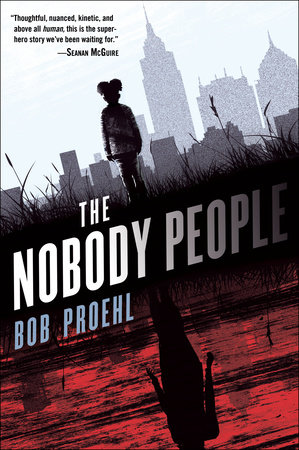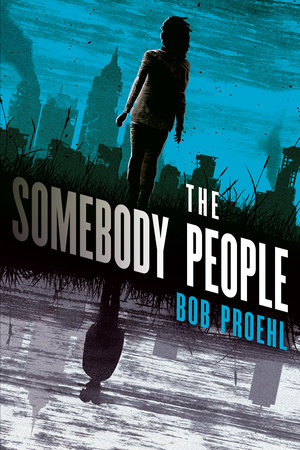Excerpt
The Nobody People
The phone on the nightstand buzzes and pulls Avi Hirsch up from a dream of being tossed in the air and falling, tossed and falling. The arc his body makes in the dream becomes a loop. He flails awake. The dream is recurrent, felt in his body rather than his mind. A year out of the hospital and he can’t remember on waking where he is. Kay has lost patience with this morning thrash of limbs and makes it a point to be up and out of bed before him. Avi grabs at the phone as it skitters toward the edge of the nightstand.
“I sent you something,” says the voice on the other end. “A weird one. Take a look.” The voice pauses, waits.
“Good morning, Louis,” says Avi. Louis Hoffman is Avi’s friend and occasional informant at Homeland Security. He works out of Homeland’s Chicago office, but he and Avi have known each other since Louis’s days as an army liaison. Louis hasn’t called since Avi got out of the hospital.
“Look at it,” Louis says. “Right on your phone. I’ll wait.”
“I’m in bed,” says Avi, rolling himself up to a seated position.
“What happened to ‘the news never sleeps’?” Louis says.
“That’s not a saying,” Avi says. “Besides, I’m not—”
“Put your eyes on it and call me immediately,” says Louis, and hangs up. Avi sees the subject line on his home screen: Roseland/Ballston Common Bombings. His heart speeds up a little, that junkie rush. He thinks about opening it right now, before anything else. But Kay has let him sleep in, which sets them all behind schedule. He puts the phone on the nightstand, facedown. He picks up the sock from the floor and his prosthetic from its spot against the bed. The physical therapist says that over time, amputees start to think of their prostheses as part of their bodies. It feels like a foreign object to Avi. It looks like a plunger capped with a plastic foot. A half-witted piece of sculpture. He goes through the ritual of attaching it to his left leg below the knee. The process is boring while requiring close attention. A bad fit becomes painful as the day wears on, unbearable by lunch. In the beginning, Kay tried to help. The angles were better. It was easier for her to perfect the fit. But Avi was so angry in those first days home from the hospital. He yelled. Swatted her hands away. He apologized, and she assured him there was no need. It was important he accept his anger, understand it as justified. She knew that in time it would flow into the correct channel rather than spilling out at her like lava over its cooled levee. Eventually she stopped offering to help with the prosthesis. She stopped offering help with stairs or getting into the minivan in case assistance implied that she thought he was helpless. She leaves him this moment every morning. Alone with his leg.
He hears the first click of the pin into the socket and eases his weight on it. There’s the deeper click, the one that echoes up his thigh. The one he can feel in his teeth. He rolls the leg of his sweatpants back down and examines his feet. The foot of the prosthesis is a shiny plastic foam, its color chosen to match Avi’s skin tone. It’s too pink, like cartoon flesh. The toes have toenails carved into them. He wonders if customers demanded this detail from the manufacturer or if the designers came up with it themselves. A little attempt at normality that makes the thing even stranger.
The floor is cold against the sole of his real foot. Avi puts on slippers and goes downstairs. Kay is at the kitchen table in the rattiest of her several bathrobes, the lavender one that offsets her dark brown skin. Her hair is up in a green silk wrap, a few tight curls escaping. She’s reading a Nnedi Okorafor novel. The amount she reads amazes Avi. She works in immigration law, zeroing in on the minutiae of the government’s shifting edicts and decrees, then fills her spare moments with science fiction and detective novels. She takes the train into the city rather than accepting a ride for the extra hour with her books. As he comes in, she gives him a bored grin that says, oh, you’re here. It’s what Avi feels reduced to this past year: the guy who keeps showing up every morning, wanted or not.
Their seven-year-old, Emmeline, is at the stove cooking eggs, standing on a stool to reach. She’s wearing an old apron over her school clothes. It’s so long on her that Avi worries she’ll trip over the hem. Her hair, a riot of dark corkscrews, is pulled back into a tie, exploding out the back of her head.
“Did you teach her that?” Kay asks. There’s an accusation built into the question, and Avi is quick to defend himself. It will be a long time before he invites Emmeline near the stove. Kay doesn’t cook. Avi taught Emmeline how to make toast, not much else. But here she is, flipping the eggs and folding them back on themselves, deft as a short order cook. Avi watches over her shoulder, then pushes her bangs back and kisses her forehead.
“Where’d you learn to cook, Leener?” he asks.
“They’re for you,” says Emmeline. “For your big day.”
It’s a smooth dodge of the question, put forth with Emmeline’s strange assuredness. She fixes Avi with her eyes, blue made paler by contrast to her skin, darker even than her mother’s. Then she goes back to work. Around the girl’s icy irises runs a ring of navy blue. When Emmeline was born, Kay’s mother said that this meant she’d have second sight. Kay told her to can it with that hoodoo noise. But there is something ethereal about their daughter. She seems to know things as if she’s come prepared for all the big moments in her life, along with some of the small ones. On Emmeline’s first day at kindergarten, when Avi dropped her off, he told her she was going to have a great day.
“No, I’m not,” Emmeline said, not sad but factual. “But you’ll come get me after I fall.”
“Always,” Avi said. He thought it was a testament to Emmeline’s faith that he’d be there for her. A verbal trust fall, he said when he recounted it. After lunch, Avi got a call from the school. One of the other kids, some racist little shit, Kay called him, had pushed Emmeline off the top of the slide. Avi sped to pick her up. Emmeline wasn’t hurt or upset. Avi told the story to other parents in the vein of isn’t it funny how prescient they seem sometimes. No one ever responded with a similar story, and Avi stopped bringing it up.
“Big day?” says Kay. She doesn’t look up from her book, but a smirk plays on her face.
“Not that I know of,” he says.
“Who was on the phone?” Kay says.
“Louis at Homeland. He sent something. I’ll look at it once I’ve got you all out the door. It’s probably nothing.”
Kay shifts her bookmark from its arbitrary spot near the back to where she’s at and closes the book. “Is it about the church by my mom’s?”
“I don’t know what it’s about,” he says. “I haven’t looked at it yet.”
“If it’s the church, you should pass it on to someone else.”
“Yeah,” he says. “I probably will.”
“Avi,” she says, hanging on that probably. She looks at him, then at Emmeline’s back, then at him again. Her meaning is clear from the fact that she won’t talk about it in front of Emmeline: I don’t want you writing about dead black girls in this house. Avi wants to tell her it’s not her business what he writes about and it’s not her decision what he can and can’t handle. He doesn’t.
“I’ll pass it off,” he says. “If that’s what it is.”
Kay holds him with her eyes a second longer, then reopens her book.
Emmeline clicks the burner off. “Today,” she says, half to herself. “Today things will start.” She scoops eggs off the skillet and onto a plate, which she hands to Avi. A moment of reversal, the child performing the action of the parent with uncanny accuracy.
“None for me?” says Kay, trying to be playful, to wipe the tension away.
Emmeline shakes her head. “You had toast,” she says. She points at the plate. “Try.” He obeys. Kay prefers her eggs a gooey, amorphous mass, so that’s how Avi cooks them. These are made for him, the way he’d make them for himself. Dry, overcooked so the snotlike quality that catches in Avi’s throat is gone.
“They’re perfect,” he says. Emmeline nods. She knew they would be.





